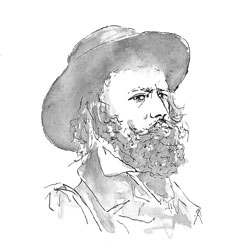Music on the Web (3): ‘Set the Wild Echoes Flying’ in Tennyson’s The Princess (1847)
http://www.youtube.com/watch?v=79z0mHUkemA&feature=related
Mychael Dama, 'Now Sleeps the Crimson Petal'
Listen to 'Now Sleeps the Crimson Petal', a song which features in the 2004 feature-film version of William Makepiece Thackeray's novel Vanity Fair. Although the music is composed by Mychael Dama, the words are Tennyson's. Thinking again about Sir Charles Stanford's remark regarding the difficulty of setting Tennyson's poetry to music (discussed in Music and Meaning 2), it is useful to read 'Now sleeps the crimson petal, now the white', as it first appeared within his longer work The Princess in 1847:
Now sleeps the crimson petal, now the white;
Nor waves the cypress in the palace walk;
Nor winks the gold fin in the porphyry font:
The fire-fly wakens: waken thou with me.
Now droops the milkwhite peacock like a ghost,
And like a ghost she glimmers on to me.
Now lies the Earth all Danae to the stars,
And all thy heart lies open unto me.
Now slides the silent meteor on, and leaves
A shining furrow, as thy thoughts in me.
Now folds the lily all her sweetness up,
And slips into the bosom of the lake:
So fold thyself, my dearest, thou, and slip
Into my bosom and be lost in me.
What Sir Charles Stanford actually claimed is that 'the perfection of vowel balance' in Tennyson's poetry was so extreme 'that very little is left for actual music to supply'. Do you think that the singer, Custer LaRue, accentuates Tennyson's vowel sounds? Sir Charles also claimed that Tennyson was 'very particular about clear diction in singing': 'he knew that the poem should be the key to the work and should be so clearly enunciated that every word can reach the listener'. Do you think that Custer LaRue does so? Finally, Sir Charles claimed it was Tennyson's opinion that 'the composer must never over-balance the voice with the illustrative detail of the accompaniment'. If you listen to Mychael Dama's composition again, you will notice that the piano part is actually quite dominant and powerful. Do you think that this detracts attention from the meaning of the words or helps add to the meaning of them?
In Tennyson and the Doom of Romanticism Herbert F. Tucker considers this poem as part of the '' tradition. He claims that 'Tennyson's deliciously narcotic version bends this carpe diem tradition in significant ways'. As we know from thinking about medical narcotics, if something is 'narcotic' it soothes, relieves, or lulls. The idea of poetry being 'narcotic' might link this poem to Tennyson's Lotus-Eaters (see Music and Meaning 6), who sang 'sweet music' and seemed 'deep-asleep' even when they weren't. What Tennyson says about 'The Lotus-Eaters' might relate to 'Now Sleeps the Crimson Petal': is there perhaps a parallel between this narrator's call for another to slip inside his bosom and 'be lost' and the Lotus-eaters' call for the sailors to abandon their other commitments and remain effectively lost at sea? If so, what do you think is revealing about this parallel?
Do you think that Dama's musical version of 'Now Sleeps the Crimson Petal' is attempting to explore a 'narcotic' effect?
What, do you think, is the effect of the fact that a woman sings 'Now Sleeps the Crimson Petal' in the BBC's Vanity Fair production?
Tucker highlights how 'Now Sleeps the Crimson Petal' 'seems to generate itself out of the sounds of its leading verb'. According to him, 'the clustered consonants' of 'sleep' 'come back reshuffled' in 'palace', and every other verb in the poem ('droops', 'leaves', 'folds', etc.) similarly 'appears a phonetic permutation of "sleeps"'. Tucker is essentially saying that lots of the words in this poem sound alike. If this is true, though, then he thinks that we can also say something more, for 'Tennyson's phonemes [units of sound] function beyond this as sememes, units of sense'. Again, the very sound of the verse (or its music) might be seen to contribute to its meaning. How do you think this might be so and does this relation between sound and sense hold true in Dama's musical interpretation of Tennyson's poem?
'Now Sleeps the Crimson Petal' is just one of a few short 'lyrics' that are embedded within Tennyson's epic poem The Princess, others of which may also interest you because of their suggestions about 'music' and 'meaning' in Tennyson's poetry. These pages should have begun to illustrate how you might begin to think about the relations between poems and songs and the ways in which different (although possibly related) meanings are conveyed by different mediums.
Further Thinking
You might want to travel to the 'Reading Tears, idle tears' section of this site, which uses analysis of another lyric from The Princess to explore various questions concerning the 'meaning' of Tennyson's poetry and how we might discover it. Alternatively, to find out more about the relations between melody and thought in other poetry by Tennyson, you can try the complete 'Music and Meaning' resource by clicking here or following the links in the menu to the left.
